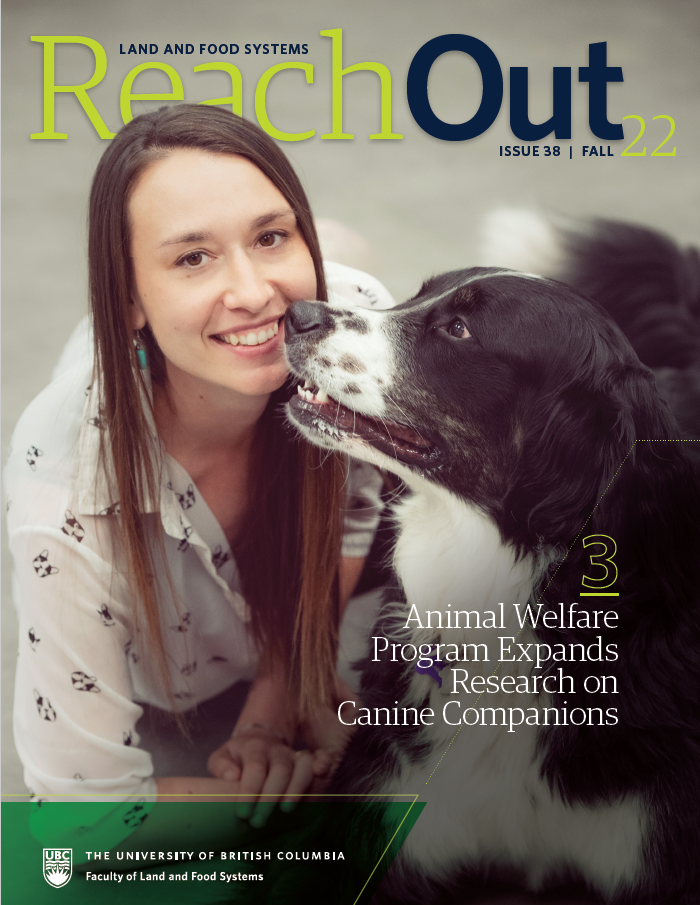Animal Welfare Program Expands Research on Canine Companions

A new lab in UBC’s Animal Welfare Program welcomes furry, four-legged participants who can provide researchers with greater insights into their cognitive abilities.
Led by Assistant Professor and Certified Applied Animal Behaviourist, Alexandra (Sasha) Protopopova, the Human-Animal Interaction Lab will use behavioural studies to understand differences in dog personality and learning. Additionally, the lab will study the welfare and behaviour of therapy and assistance dogs that help people.
“The opening of the brand new Human-Animal Interaction Lab space will finally allow us to work collaboratively with the local dog-loving community. We are excited to bring in our dog guests and their owners to learn more about our best friends,” says Protopopova. “It will also allow for teaching opportunities for graduate and undergraduate students who are interested in companion animal behaviour.”
Protopopova holds the NSERC/BC SPCA Industrial Research Chair in Animal Welfare, so her research findings are expected to impact many areas: animal shelter practices, including supporting positive behaviour of dogs living in shelters; therapy dog training practices to improve the wellbeing of dogs and the people they assist; and, general companion animal welfare knowledge.
In 2020, Humane Canada reported 20,000 dogs were taken into shelters with approximately 50% of them being adopted. Unfortunately, dog adoptions have slowed down in 2022.
“With COVID-19 restrictions ending and many going back to the office, some dog owners are discovering behavioural challenges, such as separation anxiety, in their new companions. Furthermore, the difficult economic situation and lack of access to pet-friendly affordable housing means that many are forced to rehome their beloved pets. This is now an urgent time to help dogs and owners in need.”
The lab will undertake a variety of studies, including ways to assist dog owners with their dogs’ behavioural concerns. It will also be a place for learning about animal behaviour and animal sheltering, in general.
The new lab is outfitted with 360-degree cameras and twoway mirrors, and expands the Animal Welfare Program’s ability to contribute research and applied knowledge on companion animals and the role of animals in society.
UBC’s veterinarians have reviewed the lab to ensure it’s safe for humans and dogs. Protopopova also points out researchers will ensure consent comes from dog owners and the dogs themselves using behavioural cues. For example, dogs who shy away from interacting with researchers or show signs of being tired or distracted will not be asked to continue and instead either be rescheduled or find an alternative study that would be more suitable for the dog’s comfort.
Funding for the lab came from the Canada Foundation for Innovation JELF and the BC Knowledge Development Fund. Research at the lab space is primary funded by the Natural Sciences and Engineering Research Council Discovery Grant and the Human Animal Bond Research Institute.
Those interested in having their pets participate in future studies can email hai.lab@ubc.ca.
Comparing Breed and Individual Behaviour

Amin Azadian is a PhD student in Applied Animal Biology and earned a Doctor of Veterinary Medicine from the University of Tabriz in Iran. His past research focused on domestic cats, in particular the impact of Feline Immunodeficiency Virus infection on developing age-associated cognitive impairments (Feline Dementia).
Today, he is turning his attention to the study of domestic dogs. “I was always interested in exploring how animals interact with their environment and to what extent the interaction between the genetic makeup and previous life experiences can shape the behaviour and personality of animals,” said Azadian. “I chose to study domestic dogs because the long history of artificial selection in dogs to accentuate desirable traits according to their utility to humans provides a unique opportunity to study between-breed differences in various aspects of behaviour.”
Azadian will also study dogs within a single breed with the aim of understanding the impact of previous experiences, such as the training, on learning and behaviour. By better understanding fundamental behavioural differences and their genetic underpinnings, he hopes to better classify and understand individual differences in animals, which hasn’t received a lot of attention in research studies.
Tagged with: 2022, Applied Animal Biology, Applied Biology, Faculty
